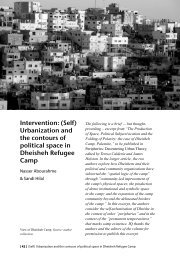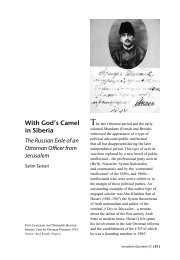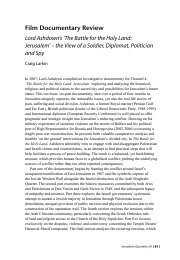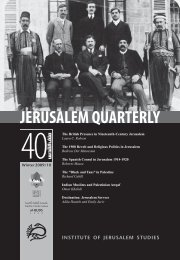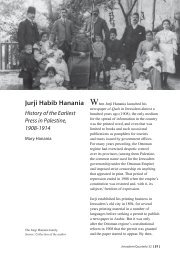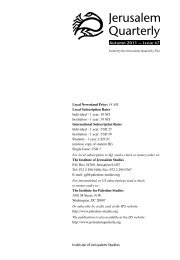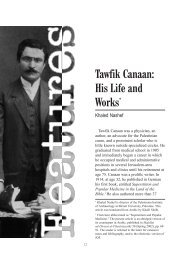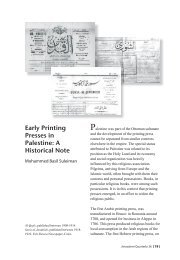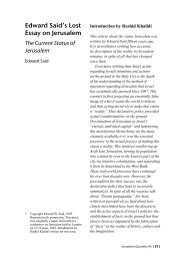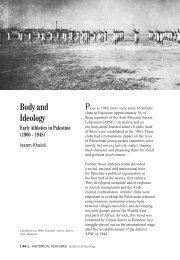PLUNDERING PALESTINE - Jerusalem Quarterly
PLUNDERING PALESTINE - Jerusalem Quarterly
PLUNDERING PALESTINE - Jerusalem Quarterly
You also want an ePaper? Increase the reach of your titles
YUMPU automatically turns print PDFs into web optimized ePapers that Google loves.
to claim remedies for their losses. It explains the implications these principles and<br />
precedents have for a prospective process of property reclamation in Israel/Palestine.<br />
In turn, it attempts to provide some guidance as to how property reparations may be<br />
formulated and claimed in the future.<br />
Reparation is a term of art under international law. It is often misunderstood as being<br />
synonymous with monetary paymentswhen it is actually a reference to a wide range of<br />
measures available to redress harm suffered by victims of conflict. As will be discussed<br />
in more detail later, under international law, states are obligated to repair their violations<br />
of law through the provision of remedies. The remedies or forms of reparation available<br />
in the event of an international wrong include restitution (restoration of the status quo<br />
ante) 2 , compensation (monetary payments), satisfaction (non-pecuniary or moral redress<br />
such as an apology or prosecution of individual perpetrators) and rehabilitation (service<br />
or care to victimized individuals or communities). These measures may be combined<br />
and prioritized within a reparation program to facilitate a peaceful resolution of conflict.<br />
The theory of reparations, which includes a diverse array of remedies, covers the<br />
full scope of Palestinian suffering. However, because this essay is mostly concerned<br />
with reparation for lost Palestinian property inside Israel, it focuses on restitution and<br />
compensation, which are the two forms of reparation typically invoked to remedy the<br />
illegal expropriation of property. Other forms of reparation such as a statement from<br />
Israel acknowledging its responsibility for creating the refugee problem and recognizing<br />
the rights of the refugees (moral satisfaction) are obviously important for reaching an<br />
end of conflict between Israelis and Palestinians but are not addressed on these pages.<br />
The recent international developments in the area of reparations and refugee return<br />
briefly reviewed here shed light on how Palestinian claims for lost properties will be<br />
organized and processed. As will be elaborated below, however, some fundamental<br />
policy questions will have to be settled before the final details of the reparation process<br />
can be determined. The fundamental questions include whether the original Palestinian<br />
property owners will repossess their properties or receive compensation in lieu of<br />
restitution. These kinds of questions should be posed to and answered by the rightsholders<br />
themselves, but will ultimately have to be settled and implemented pursuant to a<br />
negotiation process with Israel.<br />
The issue of the fate of Palestinian properties inside Israel has commonly been<br />
overlooked in favour of the more pressing issue of the right of return. In Palestinian<br />
circles in particular, the issue of reparations for property losses, damages and other<br />
suffering has been side-lined out of fear that claiming such remedies may be perceived<br />
as relinquishing the demand for return. The right of return and restitution/compensation,<br />
however, are formally independent rights. If a displaced person chooses not to return<br />
to her country, she can still repossess her property in the place. Put in context, the<br />
<strong>Jerusalem</strong> <strong>Quarterly</strong> 33 [ 57 ]



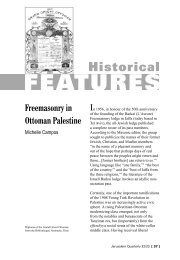
![In Search of Jerusalem Airport [pdf] - Jerusalem Quarterly](https://img.yumpu.com/49007736/1/180x260/in-search-of-jerusalem-airport-pdf-jerusalem-quarterly.jpg?quality=85)
